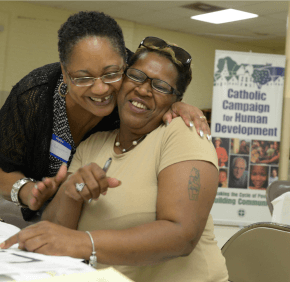By Paul McMullen
pmcmullen@CatholicReview.org
Twitter: @ReviewMcMullen
The local director of the Catholic Campaign for Human Development, the national anti-poverty campaign of the U.S. bishops, was asked if any of this year’s grant-winners could be featured in the Catholic Review’s “One Bread, One Body, One Baltimore” series.
Monsignor William F. Burke could have responded, “All of the above.”
Ten recipients of national and local CCHD grants totaling $270,000 were acknowledged Aug. 20 at St. Francis of Assisi in Baltimore, where Monsignor Burke, the longtime director of CCHD in Baltimore, serves as pastor.
 All work to right poverty and the systemic issues which led to the start of the “One Baltimore” series, after the death of Freddie Gray Jr.
All work to right poverty and the systemic issues which led to the start of the “One Baltimore” series, after the death of Freddie Gray Jr.
“This is a hope-filled day for all of us,” said Bishop Denis J. Madden, who, in addition to Monsignor Burke, was joined by Monsignor Richard J. Bozzelli and Father Ty Hullinger to support the grant recipients.
No Boundaries Coalition
The five-year-old No Boundaries Coalition of Central West Baltimore is based at St. Peter Claver Church in Sandtown, just south of where Gray, who died from injuries sustained while in police custody, was arrested in April.
It received a national grant of $40,000, to assist its efforts, which include promoting healthful options in a part of town that is otherwise a food “desert.”
“Where I live, in Sandtown, we don’t have a grocery store, period,” said Melissa Kelly, a parishioner of St. Peter and chairman of No Boundaries Coalition’s health committee. “I can walk down the street and buy a bottle of vodka, but not an apple or a banana.”
BUILD
Baltimoreans United in Leadership Development (BUILD) received a $45,000 national grant to continue its efforts to promote adequate, inclusionary housing; education and job opportunities, such as the one to which William Glover-Bey gave witness.
Glover-Bey, 58, told of the mess he had made of his life, which included using and selling drugs, and serving a total of 15 years in prison.
Through BUILD’s “Turn Around Tuesday” program, which offers, mentorship, training and job placement, Glover-Bey was able to trade a dead-end job for one in environmental care at the Johns Hopkins Medical Center.
“Over the past year, 60 people have earned jobs and several hundred are being trained,” Glover-Bey said, of Turn Around Tuesday. “That second chance has allowed me to provide for my family, organize to fix what I helped to destroy, and pay taxes so I can give back what I took.”
A list of the other recipients follows, with a brief description of their mission.
National grants
United Workers Association, $50,000. This organization offers leadership training to workers whose wages place them at or below the poverty line. It is currently working to fight plans in Curtis Bay for what it says would be the nation’s largest trash-burning incinerator.
Arundel House of Hope, $35,000. Many Catholic parishes are part of this Anne Arundel County network whose solutions include rotating a winter shelter for the homeless.
Immigration Outreach Service Center, $35,000. According to CCHD, the center trains leaders to encourage immigrants “to apply for documentation and seek job opportunities as well as language skills.”
Northeast Housing Initiative, $15,000. The initiative addresses housing needs in Northeast Baltimore.
Local grants
Youth as Resources, $15,000. Youth-led organization improves city neighborhoods.
Youth Empowerment Society, $15,000. Formerly homeless youths trained to lobby Maryland legislature.
Baltimore Algebra Project, $10,000. Youth-run organization uses math literacy to improve students’ prospects.
Amazing Grace Lutheran Church, $10,000. Southeast Baltimore community helps residents help themselves.
Also see:
Archbishop Lori pays visit to key partner in bringing relief to West Baltimore
Popemobile shipped to U.S. ahead of pope’s arrival
House of Hope, Lake Shore, parish’s turn at providing shelter includes array of services, fellowship


